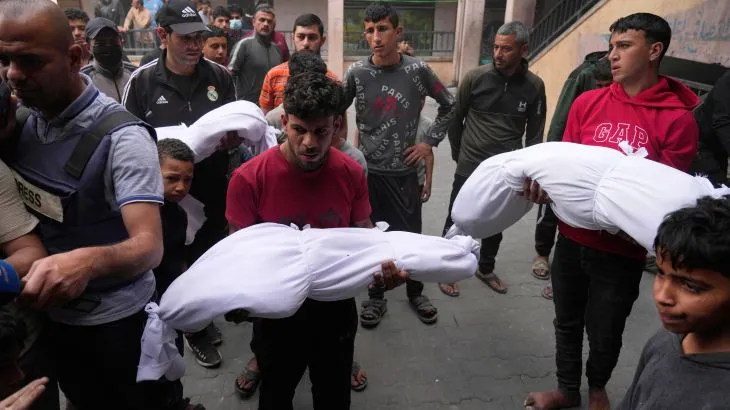Escalating Violence: Israel’s Latest Airstrikes on Gaza Casually Affects Civilians
The ongoing conflict between Israel and Hamas has taken a terrifying toll on the civilian population in Gaza, with reports of over 45 casualties in the latest airstrikes. The Israel Defense Forces (IDF) claims that their military actions are aimed at targeting Hamas terror operatives; however, the repercussions are felt heavily by innocent civilians, raising questions about the legality and morality of these strikes.
The Recent Surge in Violence
In an alarming turn of events, Israeli airstrikes have reportedly killed at least 17 individuals in Gaza in one day alone, as the Israeli Defense Forces continue their campaign against what they describe as terror infrastructures. These operations reportedly targeted military command centers, but have also resulted in extensive damage to civilian shelters and infrastructure.
Reports indicate that the Israeli strikes have not only resulted in loss of life but have also obliterated critical heavy equipment necessary for clearing rubble, hindering efforts to provide aid and assistance to the affected areas. This creates a dire humanitarian crisis, as thousands seek refuge amidst the chaos that characterizes the ever-escalating conflict.
Civilian Casualties: The Human Cost of War
The loss of life among civilians is perhaps the most tragic aspect of this ongoing conflict. While both sides of the debate have their viewpoints, the faces behind the statistics are often forgotten. Families are being torn apart, children are being left orphaned, and entire neighborhoods are being destroyed.
Eyewitness accounts highlight disturbing scenes in Gaza. Many survivors describe fleeing their homes in the dead of night, searching for shelter amidst the rubble. “We were caught off-guard. There was little warning, and suddenly the sky was full of fire,” recounted Amal, a local resident who narrowly escaped the last round of strikes.
The Israeli Justification
The Israeli government maintains that these military operations are essential in rooting out Hamas operatives and diminishing the threats posed by rocket fire. The IDF asserts that they conduct their operations with the utmost precision and care, often directing efforts to minimize collateral damage. However, the high civilian death toll paints a starkly different picture.
In stark contrast, many humanitarian organizations around the world are crying foul, expressing deep concern over the blatant disregard for civilian life and fundamental human rights. As international observers decry the loss of innocent lives, the Israeli government continues to insist on its right to defend itself against acts of terrorism.
The Global Response
The violence has sparked outrage and calls for action from various nations and organizations. The United Nations and numerous non-governmental organizations have condemned the strikes, urging both Israel and Hamas to consider the humanitarian implications of their actions. World leaders have started calling for investigations into the attacks and have urged for an immediate ceasefire to allow for humanitarian access to the affected areas.
Countries across the globe stand divided on this issue; some express unwavering support for Israel’s right to defend itself, while others condemn the excessive use of force that disproportionately affects civilians in Gaza. The calls for a balanced and just resolution continue to grow louder.
The Humanitarian Crisis
The rising death toll associated with the Israeli airstrikes comes amidst already dire conditions in Gaza. Years of conflict, blockades, and economic instability have led to deteriorating living conditions, leaving the population incredibly vulnerable to crises like this.
Access to basic necessities like food, water, and medical care has been severely restricted. Over 2 million residents endure severe restrictions, exacerbated by the recent airstrikes. Humanitarian agencies are warning of an impending disaster if interventions are not made swiftly.
The actions of military forces have made delivering humanitarian aid precarious. With critical infrastructure destroyed, supply chains are collapsing, and those brave enough to continue offering assistance to the victims risk their lives amidst ongoing bombings.
The Path Forward
The current status quo is unsustainable. Immediate action from the international community is critical to halt the violence and protect civilian lives in Gaza. Diplomatic channels need to be reopened, and discussions surrounding ceasefire and peace must take priority.
Rebuilding Gaza will take time, resources, and effort from both local and international communities. However, before any rebuilding can occur, the conflict must be addressed at its core. A long-term solution must be sought that recognizes the rights, needs, and voices of all parties involved, aiming for a just and sustainable peace.
Conclusion
The latest wave of violence in Gaza has again exposed the fragility of peace in the region and the urgent need for effective, lasting resolutions. The death of civilians cannot become merely another number in this ongoing conflict’s tragic ledger; it calls for introspection, action, and above all, a commitment to finding peace and security for all people affected by this prolonged struggle.
As the conflict continues, it’s imperative to remember those affected and advocate for a future where violence is not the answer, and life can flourish once more in Gaza and beyond.







